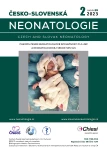-
Medical journals
- Career
A growing number of term newborns rehospitalizations and possible risks
Authors: I. Peychl; T. Voráčková; J. Kopeček; L. Černá
Authors‘ workplace: Pediatrické oddělení FN Bulovka, Praha
Published in: Čes-slov Neonat 2023; 29 (2): 138-142.
Category:
Overview
Early discharge of neonates from the maternity ward may increase the risk of rehospitalization, hypernatremic dehydration, bilirubin encephalopathy, and kernicterus. Our commissioned analysis of the number of early discharges carried out by the ÚZIS shows that the number of newborns discharged within 48 hours after birth in the Czech Republic increased from 211 to 2035 per year between 2000 and 2020, their rate thus rose from 0.2% to 1.9% of of all live births. We also carried out a study at our pediatric department, which compares two equally long periods of 8 years in terms of the number of admitted children, of which the number of children under the age of 28 days, 7 days and 2 days. We analyzed the main diagnosis, maximum bilirubinemia and, in the 2nd period, also maximum natremia. We found that in the 1st period, 5186 children were hospitalized with us, of which 299 (5.8%) were newborns, 59 (1.1%) were children under the age of 7 days, none under the age of 2 days. In the 2nd period, we admitted 5548 children, of which 449 (8%, p < 0.00001) were newborns, 151 (2.7%, p < 0.00001) aged less than 7 days, 7 aged less than 2 days. The most common diagnosis was hyperbilirubinemia, for which we treated 30 children under the age of 7 days in the 1st period (0.6% of all admitted patients), the maximum bilirubinemia at admission was 464 µmol/l. In the 2nd period, we admitted 104 children for hyperbilirubinemia (1.9%, p < 0.00001), the maximum admission bilirubinemia was 498 µmol/l. Among the children admitted up to 7 days of age, there were 9 children with hypernatremia, the highest value of natremia was 158 mmol/l. We conclude that the number of newborns discharged in the first 48 hours after birth has increased roughly tenfold in the Czech Republic over the course of 2 decades. The number of rehospitalized newborns at our workplace has also increased significantly over the past 8 years, most of all in the case of children in the early neonatal period. Rehospitalisations for hyperbilirubinemia also increased significantly in this group of children and some cases of hypernatremia occurred.
Keywords:
newborn, early discharge, risks, kernicterus, hypernatremia
Sources
- Ebbesen F, Bjerre JV, et al. Relation between serum bilirubin levels ≥ 450 μmol/l and bilirubin encephalopathy; a Danish population-based study. Acta Paediatr 2012; 101(4): 384–9.
- Oddie SJ, Craven V, et al. Severe neonatal hypernatraemia: a population based study. Arch Dis Child Fetal Neonatal Ed 2013; 98(5): F384–7.
- Moritz ML, Manole MD, et al. Breastfeeding-associated hypernatremia: are we missing the diagnosis? Pediatrics 2005; 116(3): e343–7
- Donneborg ML, Hansen BM, et al. Extreme neonatal hyperbilirubinemia and kernicterus spectrum disorder in Denmark during the years 2000–2015. J Perinatol 2020; 40 : 194–202.
- Alkén J, Håkannsson S, et al. Rates of extreme neonatal hyperbilirubinemia and kernicterus in children and adherence to national guidelines for screening, diagnosis and treatment in Sweden. JAMA Netw Open 2019; 2(3): e190858.
- Butler B, Trotman H. Hypernatremic dehydration in breast fed infants: lessons from a baby-friendly hospital. J Trop Pediatr 2020; 00, 1–7.
- Bozkurt Ö, Yücesoy, et al. Severe neonatal hyperbilirubinemia in the southeast region of Turkey. Turk J Med Sci 2020; 50(1). Article 14.
- Capasso L, Palma M et al. Neonatal hyperbilirubinemia: an updated appraisal of national guidelines. Curr Pediatr Rev 2020; 16 : 298–306.
- Tsao P, Yeh H, et al. Long-term neurodevelopmental outcomes of significant neonatal jaundice in Taiwan from 2000–2003: a nationwide, population-based cohort study. Sci Rep 2020; 10 : 11374. Dostupný na: https://doi.org/10.1038/s41598-020-68186-w.
- Kubejová K, Koľvek G et al. Hypernatriemická dehydratácia. Čes-slov Pediatr 2021; 76(3): 147–151.
- Sarin A, Thill A et al. Neonatal hypernatremic dehydration. Pediatr Ann 2019; 48(5): e197–200. Dostupný na: https://doi. org/10.3928/19382359-20190424-01.
- Harma D, Harisch R et al. Early neurodevelopmental outcome of neonates with gestation 35 weeks of more with serum bilirubin in exchange range without encephalopathy: a prospective observational study. Neonatal Netw 2021; 40(2): 66–72.
- Iskander I, Gamaleldin R. Acute bilirubin encephalopathy: some lessons learned. Semin Perinatol 2021; 45 : 1–4.
- Bozkurt Ö, Yücesoy E et al. Severe neonatal hyperbilirubinemia in the southeast region of Turkey. Turk J Med Sci 2020; 50(1). Dostupný na: https://doi: 10.3906/sag-1906-22.
Labels
Neonatology Neonatal Nurse
Article was published inCzech and Slovak Neonatology

2023 Issue 2-
All articles in this issue
- PREFACE
- EDITORIAL
- Standardized procedure for stabilization and resuscitation of premature newborns
- Graded target saturation according to post-menstrual age
- Surfactant treatment
- Non-invasive pulmonary ventilation of newborns in CPAP and HFNC mode
- Basic principles of mechanical ventilation in immature newborns and used ventilation modes
- Systems for automatic oxygen dosing during artificial lung ventilation
- Outpatient care of infants with severe lung disease arising in the perinatal period
- Respiratory failure and ECMO in neonates
- A growing number of term newborns rehospitalizations and possible risks
- Pokyny pro autory
- Czech and Slovak Neonatology
- Journal archive
- Current issue
- Online only
- About the journal
Most read in this issue- Non-invasive pulmonary ventilation of newborns in CPAP and HFNC mode
- Surfactant treatment
- Standardized procedure for stabilization and resuscitation of premature newborns
- Respiratory failure and ECMO in neonates
Login#ADS_BOTTOM_SCRIPTS#Forgotten passwordEnter the email address that you registered with. We will send you instructions on how to set a new password.
- Career

